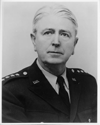General George C Marshall
General of the Army George Catlett Marshall, GCB, US Army (December 31, 1880 – October 16, 1959) was an American military leader, Secretary of State, and the third Secretary of Defense best remembered for his leadership in the Allied victory in World War II and for his work establishing the post-war reconstruction effort for Europe, which became known as the Marshall Plan.
George C. Marshall was born into a middle-class family in Uniontown, Pennsylvania, about 40 miles southeast of Pittsburgh. He was educated at Virginia Military Institute. He entered the US Army after graduation, rising to the position of Army Chief of Staff, and served continuously, including in World War I (on the staff of General John Pershing) and World War II, until his retirement in 1945. In 1964, the The George C. Marshall Foundation was established at the Virginia Military Institute to honor Marshall’s character and career. Marshall was promoted to Brigadier General in October 1936. On September 1 1939, the very start of World War II in Europe, he was selected by Franklin D. Roosevelt to be Army Chief of Staff, a position he held until 1945. In 1944, he became the first U.S. General to be awarded 5-star rank, otherwise known as General of the Army. This position is the American equivalent in rank to Field Marshal.
Marshall once joked that he was glad the U.S. never created a “Field Marshal” rank during World War II, since he would then have to be addressed as “Marshal Marshall”. During World War II, Marshall was instrumental in getting the U.S. Army and Army Air Corps reorganized and ready for combat. Marshall wrote the document that would become the central strategy for all Allied operations in Europe, selected Dwight Eisenhower as Supreme Commander in Europe, and designed Operation Overlord, the invasion of Normandy. His success in working with Congress and President Franklin D. Roosevelt, along with his refusal to lobby for the position, ultimately resulted in his being passed over as the Supreme Allied Commander in charge of the D-Day invasion. At the time, the President told him: “I couldn’t sleep nights, George, if you were out of Washington.”
Throughout the remainder of the World War II, Marshall coordinated all Allied operations in Europe and the Pacific. He was characterized as the organizer of Allied victory by Winston Churchill. Time Magazine named Marshall Man of the Year in 1943. Marshall resigned from his post of Chief of Staff in 1945 but did not retire as regulations stipulate that Generals of the Army remain on active duty for life. After World War II, Marshall was sent to China to negotiate a truce and build a coalition government between the Nationalists and Communists fighting the Chinese Civil War. His efforts failed and he was recalled in January 1947.
Upon his return, Marshall was named Secretary of State in 1947. In this role, on Thursday June 5, 1947 at a speech at Harvard University, he outlined the U.S. government’s preparedness to contribute to European recovery. The European Recovery Plan, which became known as the Marshall Plan, helped Europe quickly rebuild and earned Marshall the honor of being named TIME’s Man of the Year in 1948 and receiving the Nobel Peace Prize in 1953. As Secretary of State, Marshall strongly opposed recognizing the State of Israel telling President Truman, “If you (recognize the state of Israel) and if I were to vote in the election, I would vote against you.”
In 1949, he resigned from the State Department and was named president of the American National Red Cross.
Copyright © 2007 - 2026. All Rights Reserved.
Original Coding by Goimage Media Services

